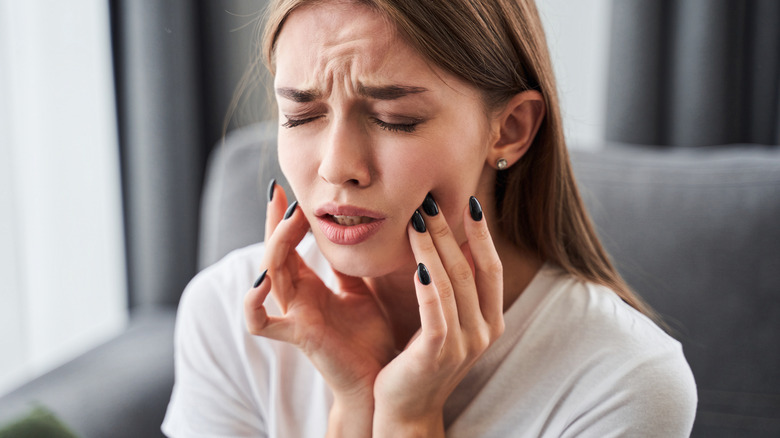Drinking Diet Soda Has An Unexpected Effect On Your Teeth
According to the World Health Organization (WHO), free sugar consumption is the primary dietary risk factor for tooth decay and cavities. Together, the combination of sugar and the natural bacteria in our mouth produce acid that causes demineralization of the tooth. Because diet soda takes sugar out of the equation, it might seem like a healthier alternative to regular soda. However, these products can still do quite a number on our teeth in the form of dental erosion.
A 2021 study used national survey data collected between 2003 and 2004 to examine participant diet and related dental health, particularly in relation to beverage consumption. Evidence of dental erosion lesions was present in 80% of the participants. When it came to beverage consumption, the researchers looked at four distinct groups: Those who consumed high levels of water, diet drinks, coffee or tea, and soda. Between the four groups, the diet drinks cluster had the highest rates of dental erosion, with 85% of these individuals showing evidence of tooth erosion. However, with dental erosion detected in nearly 79% of the water drinkers group, researchers noted that the risk of dental erosion between the two groups was only slightly higher in the diet drinks group.
Diet soda increases the risk of dental erosion
Instead of sugar, diet sodas contain greater amounts of acid, including citric acid, phosphoric acid, and tartaric acid. While it's easy to assume that darker-colored sodas like Coke might be the worst offenders, Sprite, Mountain Dew, and other citrusy sodas that contain greater amounts of acid can actually be just as bad.
Unfortunately, our teeth aren't designed to handle high levels of acidity. After taking a swig of diet soda, these acids proceed to break down tooth enamel for as long as 20 minutes after the fact. For routine diet-soda drinkers, that's a lot of damage for enamel to take on each and every day, eventually leading to dental erosion. Because our enamel serves as a barrier between our environment and the innermost part of the tooth, the deterioration of this barrier through dental erosion can lead to tooth sensitivity. This can cause significant discomfort when eating hot or cold food items, as well as increase one's risk for cavities.
Beverages that can help keep tooth enamel healthy
Limiting soda consumption is one of the best ways to keep our tooth enamel strong and healthy. However, we all want to treat ourselves every now and again. To minimize the damage, use a straw when drinking diet soda to minimize direct exposure to one's teeth. Additionally, it's better to finish your beverage all at once rather than sipping on it continuously throughout the day. Afterward, hold off on brushing your teeth for about 30 minutes. Instead, swish and spit with some mouthwash or drink a cup of water. By flushing your mouth with H2O, you'll help cleanse your teeth of acid.
Alternatively, consider reaching for more dental-friendly beverages. This includes milk, which harbors protective proteins and various minerals that can help mend and prevent enamel damage. However, this doesn't apply to milk products that contain sugar additives, such as strawberry milk or chocolate milk. Next up are black tea and green tea. Rich in fluoride, Cleveland Clinic experts explain that fluoride can decrease our risk of cavities, stop early tooth decay in its tracks, and replenish our teeth with minerals lost from the demineralization process.



